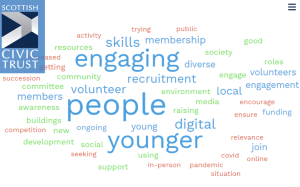 Scottish Civic Trust has built on its survey of how the past two years drastically changed how Scotland’s civic and heritage groups engage with audiences.
Scottish Civic Trust has built on its survey of how the past two years drastically changed how Scotland’s civic and heritage groups engage with audiences.
… despite these difficulties, local civic and heritage groups continue to engage…
The Scottish Civic Trust writes:
The events of the past two years drastically changed how Scotland’s civic and heritage groups engage with audiences. As COVID-19 lockdowns and social distancing kept people separated and at-home, online audiences skyrocketed. Local civic and heritage groups had to pivot to new and often unfamiliar digital platforms, and could struggle with digitally engaging volunteers. Events were cancelled, projects were postponed and funding became even more difficult to source.
Two years on from the pandemic, we sent out a survey to local civic and heritage groups across Scotland to see how they were faring and ask them about their activities, membership, and plans for the future. We contacted our affiliated groups directly via email, and also shared the survey more widely on our e-newsletter and social media. We received 53 responses, representing 47 civic and heritage groups across Scotland.
Given the difficulties of the last few years, it is unsurprising that respondents highlighted sourcing funding, expanding membership, developing digital skills and recruiting volunteers as major issues facing Scotland’s civic and heritage groups.
However, responses showed that despite these difficulties, local civic and heritage groups continue to engage with their local areas and communities in a range of ways. Lecture series was the most popular activity with 37 groups picking this option. 22 groups stated that ‘commenting on planning submissions’ was one of their main activities, including both small local societies and larger building trusts. Local small-scale and large-scale projects were chosen by 29 groups with projects ranging from conserving listed buildings to the erection of plaques. And finally, 7 groups stated that they run a local museum or heritage centre and hold exhibitions on local topics.
Moreover, it is clear that respondents were committed to tackling challenges head on and expanding their work by trialling new ways to diversify their membership and audiences. In particular, groups mentioned that engaging younger people was a main priority for their work, with some groups also highlighting their interest in involving people of colour, disabled people and working class people.
Expanding involvement with and access to built heritage in Scotland is a priority for us at the Scottish Civic Trust, and we’re pleased to see our local groups express an interest in doing the same. We’ve already begun to develop a suite of inclusive heritage resources to support local groups in reaching new and more diverse audiences, including:
- Co-creating Heritage Projects with Marginalised People
- Using Social Media to Promote Heritage
- Micro-volunteering for Heritage: The Sustainable Future for Heritage Volunteering?
- Restoring our Future: How Investing in Buildings Can Make For Fairer, Greener Places
- Inclusive Events Toolkit
- Exploring LGBTQIA+ Heritage in Scotland
- Sharing Stories: Participation in Heritage by People of Ethnic Minority Backgrounds
- Race and Heritage in Scotland
- Strategy to Address Racism Against People of Colour
In the coming months, we look forward to developing our relationships with local groups as we work together to care for our local places and make Scotland’s heritage for all.

